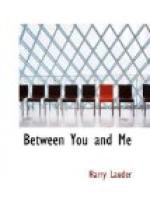There’s a word they use in America aboot the man who tries to be all things to a’ men—who tries to please both sides when he maun talk aboot some question that’s in dispute. They call him a “pussyfooter.” Can you no see sicca man? He’ll no put doon his feet firmly—he’ll walk on the balls of them. His een will no look straight ahead, and meet those of other men squarely. He’ll be darting his glances aboot frae side to side, looking always for disapproval, seeking to avoid it. But wall he? Can he? No—and weel ye ken that—as weel as I! Show me sicca man and I’ll show you one who ends by having no friends at all—one who gets all sides down upon him, because he was so afraid of making enemies that he did nothing to make himself freinds.
Think straight—talk straight. Don’t be afraid of what others will say or think aboot ye. Examine your own heart and your own mind. If what you say and what you do suits your ain conscience you need ha’ no concern for the opinions of others. If you’re wrong—weel, it’s as weel for you to ken that. And if you’re richt you’ll find supporters enough to back you.
I said, whiles back, that I’d in my mind cases of artists who thocht themselves sae great they need no think o’ their public. Weel, I’ll be naming no names—’twould but mak’ hard feeling, you’ll ken, and to no good end. But it’s sae, richt enough. And it’s especially sae in Britain, I think, when some great favorite of the stage goes into the halls to do a turn.
They’re grand places to teach a sense of real value, the halls! In the theatre so muckle counts—the play, the rest of the actors, reputation, aye, a score of things. But in a music hall it’s between you and the audience. And each audience must be won just as if you’d never faced one before. And you canna be familiar wi’ your audience. Friendly—oh, aye! I’ve been friendly wi’ my audiences ever since I’ve had them. But never familiar.
And there’s a vast difference between friendliness and what I mean when I say familiarity. When you are familiar I think you act as though you were superior—that’s what I mean by the word, at least, whether I’m richt or no. And it’s astonishing how quickly an audience detects that—and, of course, resents it. Your audience will have no swank frae ye—no side. Ye maun treat it wi’ respect and wi’ consideration.
Often, of late, I’ve thocht that times were changing. Folk, too many of them, seem to have a feeling that ye can get something for nothing. Man, it’s no so—it never will be so. We maun work, one way or another, for all we get. It’s those lads and lassies who come tae the halls, whiles, frae the legitimate stage, that put me in mind o’ that.
Be sure, if they’ve any real reputation upon the stage, they have earned it. Oh, I ken fine that there’ll be times when a lassie ’ll mak’ her way tae a sort of success if she’s a pretty face, or if she’s gained a sort of fame, I’m sorry to say, frae being mixed up in some scandal or another. But—unless she works hard, unless she has talent, she’ll no keep her success. After the first excitement aboot her is worn off, she’s judged by what she can do—not by what the papers once said aboot her. Can ye no think of a hundred cases like that? I can, without half trying.




